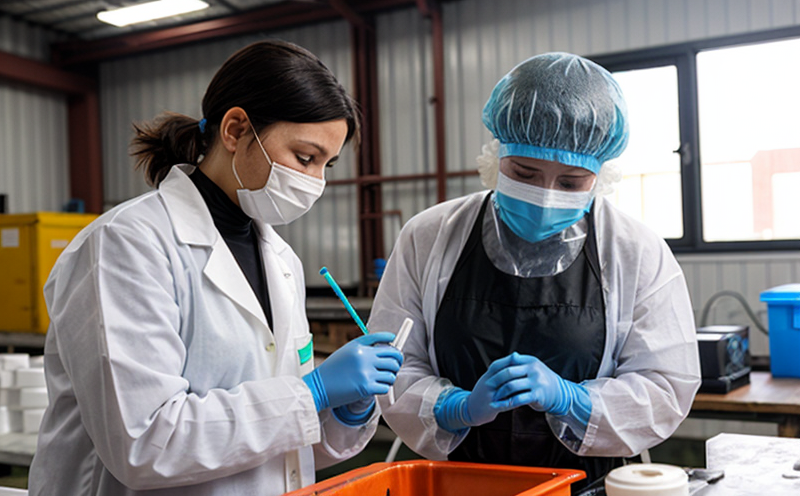ISO 4624 Adhesion Strength of Recycled Coated Surfaces with Nanomaterials
The ISO 4624 standard provides a method for determining the adhesion strength between coated surfaces and their adherends using recycled nanomaterials. This is particularly relevant in industries where sustainability and environmental responsibility are paramount, such as automotive, construction, and electronics manufacturing.
Recycled materials offer a sustainable alternative to virgin materials, reducing waste and conserving resources. However, the use of recycled nanomaterials introduces unique challenges related to their compatibility with existing coating systems. Ensuring strong adhesion between these materials is critical for maintaining product performance and durability. This standard provides a standardized approach to testing this adhesion strength.
The test procedure involves preparing specimens from coated substrates containing recycled nanomaterials, applying stress by peeling or adhering the specimen to another material, and measuring the force required to detach the coating from the substrate. The results help manufacturers understand how well their coatings bond with recycled materials under various conditions.
Understanding this adhesion strength is essential for several reasons:
- To ensure that products made using recycled nanomaterials meet quality and performance standards.
- To identify potential weaknesses in the bonding process, allowing for improvements in manufacturing processes.
- To comply with regulatory requirements related to product safety and environmental impact.
By adhering to this standard, organizations can demonstrate their commitment to sustainability while maintaining high-quality products. This not only enhances brand reputation but also opens up new markets for recycled materials in industries that prioritize eco-friendly practices.
The process outlined in ISO 4624 is designed to be rigorous yet practical, ensuring accurate and reliable results. It involves precise specimen preparation, controlled environmental conditions during testing, and detailed recording of all variables involved. This ensures that any discrepancies can be traced back to specific factors, providing valuable insights for quality improvement.
Testing according to ISO 4624 helps ensure consistency across different batches of recycled nanomaterials and coating systems. By standardizing the testing procedure, manufacturers can compare results more effectively, facilitating better decision-making regarding material selection and process optimization.
In summary, adherence to ISO 4624 is crucial for maintaining product integrity in an increasingly environmentally conscious world. It enables businesses to balance sustainability goals with performance expectations, ensuring both ecological responsibility and competitive edge.
Why It Matters
The adhesion strength between coated surfaces and their adherends is a critical factor in the performance and longevity of many products. In sectors like automotive manufacturing, where lightweight materials are sought after for improved fuel efficiency, ensuring strong adhesion between recycled nanomaterials and coatings becomes even more important.
Recycled nanomaterials offer significant environmental benefits by reducing waste and conserving resources. However, their incorporation into existing coating systems presents unique challenges due to potential differences in chemical composition, morphology, and surface properties compared to virgin materials. These differences can affect the adhesion strength, which directly impacts the overall performance of the product.
For instance, in the automotive industry, poor adhesion could lead to premature peeling or flaking of paint layers during routine maintenance or harsh environmental conditions. In construction applications, weak adhesion might result in compromised structural integrity over time. Therefore, testing this adhesion strength according to ISO 4624 is not just a compliance requirement but also a key step towards enhancing product reliability and customer satisfaction.
Incorporating recycled nanomaterials into coating systems can provide additional benefits such as enhanced scratch resistance or improved thermal conductivity. However, these advantages must be balanced against the potential impact on adhesion strength. By adhering to ISO 4624, manufacturers can ensure that any enhancements do not come at the expense of product performance.
The results from this standardized testing help inform decisions about material selection and process optimization. This ensures that products made using recycled nanomaterials meet both quality and environmental standards, thereby contributing to sustainable development goals without compromising on functionality or safety.
Benefits
The implementation of ISO 4624 adhesion strength testing brings numerous advantages for businesses operating in sectors that utilize recycled nanomaterials. Firstly, it provides a reliable method to assess the compatibility between recycled materials and coating systems, ensuring consistent quality across different batches.
Secondly, this standard facilitates better decision-making regarding material selection by offering insights into how well various types of recycled nanomaterials bond with specific coatings under different conditions. This information is invaluable for R&D teams looking to innovate within sustainable practices while maintaining product performance.
Thirdly, adherence to ISO 4624 helps manufacturers comply with regulatory requirements related to product safety and environmental impact. Many governments are implementing policies aimed at reducing waste and promoting the use of recycled materials in manufacturing processes. By participating in such testing, companies can demonstrate their commitment to these initiatives, potentially gaining a competitive advantage.
Furthermore, this standard promotes transparency within supply chains by providing clear criteria for evaluating the quality of recycled nanomaterials used in products. This fosters trust among stakeholders, including customers who value environmentally friendly choices and investors seeking socially responsible investments.
The benefits extend beyond regulatory compliance to include enhanced product reliability and customer satisfaction. Products that consistently meet adhesion strength requirements are less likely to fail prematurely due to poor bonding between layers or components. This leads to reduced warranty costs and increased customer loyalty, both of which contribute positively to the bottom line.
In conclusion, implementing ISO 4624 adhesion strength testing offers tangible benefits for businesses in sectors utilizing recycled nanomaterials. These include improved product quality, enhanced innovation capabilities, strengthened compliance with environmental regulations, greater transparency within supply chains, and ultimately, increased customer satisfaction and loyalty.
Industry Applications
- Automotive Manufacturing: Ensuring strong adhesion between recycled nanomaterials in coatings used on vehicle bodies to enhance durability and resistance against wear and tear.
- Construction Industry: Evaluating the bond strength of recycled nanomaterials incorporated into paints or sealants applied to building facades for improved longevity and reduced maintenance needs.
- Electronics Manufacturing: Testing adhesion between coatings containing recycled nanomaterials on electronic components like circuit boards to prevent corrosion and ensure reliable performance over time.





